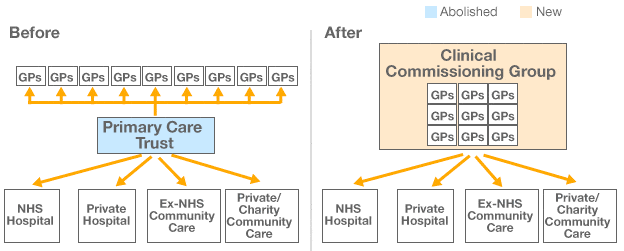
Governments have used the opportunity to cut services. As Naomi Klein has described in many different situations, those who oppose the welfare state never waste a good crisis
Of Gavino Maciocco University of Florence – 05/08/2014 – Rassegna.it
 “Sir, we as public health doctors, academics and specialists are distressed about the health reform bill presented by the government. The reform will cause irreparable damage to the NHS, individual patients and society as a whole. Health will become so highly commercialized that it will fragment care, exacerbate patient safety risks, erode medical ethics and trust in the health system, widen inequalities in health, waste a lot of money trying to regulate competition, undermine the system's ability to respond effectively to epidemics and other public health emergencies.
“Sir, we as public health doctors, academics and specialists are distressed about the health reform bill presented by the government. The reform will cause irreparable damage to the NHS, individual patients and society as a whole. Health will become so highly commercialized that it will fragment care, exacerbate patient safety risks, erode medical ethics and trust in the health system, widen inequalities in health, waste a lot of money trying to regulate competition, undermine the system's ability to respond effectively to epidemics and other public health emergencies.
The heartfelt appeal signed by 400 eminent personalities from the academic and scientific world, addressed to the House of Lords, published in the London newspaper The Daily Telegraph and taken from lancet, failed to block the progress of the health care reform proposal, which became law on 27 March 2012 and entered into force on 1 April 2013. With this reform, wanted by the government led by the conservative premier Cameron, the face of the National has radically changed health service (NHS). i have been abolished Primary care trusts (equivalent to our ASL), replaced by consortia of general practitioners (Gps, family doctors), named Clinical commissioning groups (ccgs).
The CCGS represent the real linchpin of the system: 211 across England, they are the recipients of £65 billion of public funds (nearly 70 per cent of the £95 billion of the entire national health budget). The Ccgs are entrusted not only with the management of primary care, but also with the commissioning, the purchase under the market regime, of specialist and hospital services. The fact that it is the GPS providers who choose and remunerate the providers has raised the question of their potential conflict of interest: GPS prescribers of services provided by private providers, with possible interests in common with the GPS themselves.
“Half of family doctors in consortia have financial ties to private providers. The fact that GPSs have external interests can influence their decisions in choosing providers and can jeopardize the relationship of trust with their patients, because they can be wary of the reason why they have been sent for a particular treatment". says Clare Gerada, president of the Royal College of GPS. He adds: "This can also damage the National health service, because having many different providers can increase costs and fragment assistance, to the detriment of patients".
Another critical element is the loss of the national dimension of definition of the essential levels of assistance, assigned before the reform to the Ministry of Health, which established the services that public structures were required to guarantee uniformly throughout the territory and also the levels of participation in the expense, for some limited categories of services. With the reform, each of the CCGS will establish which services will be guaranteed to patients and also the levels of participation in the expenditure.
Not only. To aggravate the situation there are also the cuts made by the Cameron government to the health budget (minus 20 billion pounds by 2015) and to other welfare sectors, which negatively affect health care. He recently wrote about Guardian Simon Atkins, a GP: “An increasing number of people are crowding into our surgeries due to government policies. This has disproportionately cut services for the poor, the elderly and the disabled and every day I see people who are in great difficulty. Due to the cuts, a day center in our neighborhood was closed, which gave support and the possibility of companionship to many people".
So far the situation in the United Kingdom. Now let's see what theSpain. The Iberian country adopted a universalistic model very similar to ours in 1986, with the Ley general de sanidad(Institution of the National Health Service). One of the fundamental characteristics of the Spanish healthcare system – and of the public administration in general – is its decentralisation. The 17 Regions enjoy great autonomy with respect to the central government. The same health reform of 1986 was applied gradually in the various regional realities. Catalonia and Andalusia started first, then the Basque Country and Valencia and, only in 2002, the reform entered into force throughout Spain.
Another specific aspect of regional autonomy concerns the financing of the health system. State funds reach the Autonomous Communities without finalizing individual expenditure items: it is the Communities themselves that establish the amount of resources to be allocated to the health sector, causing significant regional differences in public health expenditure (the expenditure of Navarre is 40 per percent higher than that of the Valencian Community). Until recently, the Spanish system was considered a successful model, with expenditure among the lowest in OECD countries (comparable to the Italian one). Then came the debt crisis and Spain suffered very heavy economic and financial consequences, with a dramatic recession and a very high unemployment rate.
The recipe for coping with the crisis has heavily involved the health sector. With a royal decree approved in April 2012, a series of measures were adopted to reduce healthcare expenditure by 7 billion euros: from the increase in co-payments (also imposed on pensioners, who had remained exempt until then) to a considerable cut of the salaries of health personnel (almost 20 per cent). The very symbolic value of the universalistic system has been called into question, through the transition to an insurance system based on employment (like the one existing at the time of Franco) and with the Royal Decree which even establishes that users of the Health Service are called non more "citizens".
Martin McKee wrote on the British Medical Journal, referring to the reforms of the Cameron government (but the same reasoning applies to what happened in Spain and could also happen in Italy): “The economic crisis has offered the government the opportunity that comes only once in a lifetime. As Naomi Klein has described in many different situations, those who oppose the welfare state never waste a good crisis.





